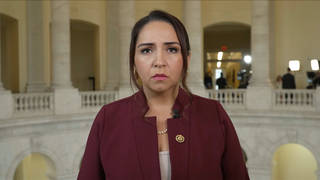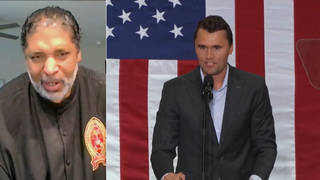
Guests
- Max Fraad Wolffteaches economics in the New School University Graduate Program in International Affairs.
The Senate has passed a sweeping reform of financial regulation that’s been described as the biggest overhaul of financial rules since the 1930s. The 59-to-39 vote came largely on party lines. Two Democratic senators, Russ Feingold of Wisconsin and Maria Cantwell of Washington, voted against the bill, saying it does not go far enough in preventing another economic meltdown. Four Republicans also broke party ranks to support the measure. [includes rush transcript]
Transcript
JUAN GONZALEZ: By a 59-to-39 vote, the Senate
passed a sweeping reform of financial regulation last night that has been described as the biggest overhaul of financial rules since the 1930s.
The bill passed largely along party lines. Two Democratic senators, Russ Feingold of Wisconsin and Maria Cantwell of Washington, voted no, saying the bill does not go far enough to prevent another economic meltdown. Four Republicans voted in favor: Senators Susan Collins and Olympia Snowe of Maine, Scott Brown of Massachusetts, and Charles Grassley of Iowa.
Among its provisions, the legislation creates a new Bureau of Consumer Financial Protection within the Federal Reserve to help prevent abusive lending by mortgage and credit card companies. It establishes a new council of “systemic risk” regulators to help prevent companies from becoming too big to fail. And for the first time, the Government Accountability Office will be empowered to do a one-time audit of the Federal Reserve. The federal government will be given the power to seize and liquidate failing financial companies without the need for more bailouts. And some new regulations will be placed on the derivatives markets, hedge funds and credit rating agencies.
President Obama praised the legislation on Thursday.
PRESIDENT BARACK OBAMA: The reform I sign will not stifle the power of the free market. It will simply bring predictable, responsible, sensible rules into the marketplace. Unless your business model is based on bilking your customers and skirting the law, you should have nothing to fear from this legislation. As we continue to emerge from this recession, this reform is one important step that will strengthen our economy.
AMY GOODMAN: Washington’s Democratic senator Maria Cantwell voted against the bill after saying it does not do enough to regulate derivatives trading.
SEN. MARIA CANTWELL: We’re still having this debate here about whether we’re going to have clearing of these derivatives. To me, it’s critical. I know there’s other good parts of this legislation that people care deeply about. But if you have this $600 trillion market and you are not truly going to have exchange trading and clearing and aggregate position limits across all exchanges, you are not going to rein in the derivatives problem. You’re not. This issue is a fundamental one. We won’t have reform if we don’t have exchange trading and clearing, if we don’t bring derivatives onto the same kind of mechanisms we have for other products in the financial markets. And if we don’t do that, then I don’t know what we’re doing out here, in the context of what brought us to this crisis. Trading of dark market derivatives is what has brought this challenge to our US economy. Let’s bring some transparency into that market. Let’s adhere these words and actually implement this, so we can move on with this legislation.
AMY GOODMAN: The financial regulatory bill now appears headed to a House-Senate conference committee, where lawmakers will work to resolve differences between the two chambers. The House of Representatives passed a similar bill six months ago. Lawmakers are expected to come under intense pressure from Wall Street lobbyists to weaken parts of the bill in committee. According to an analysis by the Center for Public Integrity, 850 businesses, trade groups and other corporate interests have hired more than 3,000 lobbyists to shape the bill. That’s roughly five lobbyists for each member of Congress.
To talk more about the legislation, we’re joined by economist Max Fraad Wolff. He’s an economist and frequent contributor to the Huffington Post and other publications.
What about this bill? And what about what Senator Cantwell just said, that it doesn’t go far enough?
MAX FRAAD WOLFF: I think Senator Cantwell makes a series of good points. I do think there’s a tectonic shift toward greater regulation of derivatives. I do think that having a regulated market with a clearing process and public information is a step forward. But even already, there are loopholes in here that you could probably sort of squeeze a large truck through. And that’s before the reconciliation process, which will be dominated, or at least heavily massaged and influenced, by that small army of lobbyists that you just referenced. So, I understand her frustrations, although I’m not sure that it makes the bill devoid of any benefit or any forward movement.
JUAN GONZALEZ: Now, the President, Obama, in hailing this, has said that the banks were not able to get what they wanted. But in reality, it appears that, at least in certain areas, the administration is continuing to support changes to — now, as we go into the reconciliation process, that the banking industry wants. Could you talk about some of those?
MAX FRAAD WOLFF: Sure. I mean, I think that there were a few amendments in the Senate — sort of the Kaufman-Brown, maybe most famously, or the reinstatement of Glass-Steagall — and there were certain provisions in the original House version — excuse me — that passed in December that were the most fearsome and disliked by Wall Street, let’s say. And the administration has generally pushed to get rid of those provisions least liked by the big banks and to move it toward a more moderate, centrist position, which is much more palatable both to the four Republicans we saw vote for it and also to the banking industry. The banking industry less to fear and more to like in the version that we saw pass last night than the version we saw come out of Barney Frank’s committees in the House in December of last year.
JUAN GONZALEZ: Now, one of those — isn’t it? — is the whole issue of where will this new Consumer Protection Agency be? Will it be an independent agency, or will it be inside the Federal Reserve, which the Senate bill has it inside the Federal Reserve or overseen by the Federal Reserve, and the House version has it as an independent agency?
MAX FRAAD WOLFF: The financial markets and the banks do not want to see the Federal Reserve be disempowered relative to Congress. They’re much happier working with the Federal Reserve. And most people believe that the central bank independence we have in the United States is important to the financial markets, financial firms and our system as it’s been at least for the last thirty years. The House bill was much more disempowering to the Federal Reserve and empowering to Congress. The Senate version, which was supported, including the provisions supported by the administration, make the Federal Reserve much more powerful, not enormously more accountable, and are therefore much more favored by financial economists along central bank independence lines and by the large banking institutions, without a doubt.
AMY GOODMAN: Do you think this is a tremendous accomplishment and will mean the kind of shift people are talking about, going back to the 1930s?
MAX FRAAD WOLFF: No. I do think that it is — does move the ball forward. There are some very good provisions in here. There are some provisions in here that I think are more or less for show and slightly meaningless. And I think you always have the problem with legislation that we famously discuss with the generals, that they’re always fighting the last war. And what you have in here is a combination of cherry-picking things, some of which I don’t think are the actual cause of the problems from 2008 and some of which I do, but also kind of fighting the last war, and the next war will always be different. And I do think that we need to be honest that mostly the financial markets expressed the degree of the imbalances and the structural problems in our economy; they didn’t create them, and they aren’t solely responsible for them.
AMY GOODMAN: What is most important about what was passed last night?
MAX FRAAD WOLFF: Probably the things I think that are most important are to have a Consumer Financial Protection Agency that begins to take this huge shadow banking industry that we have, which is bank-like but not regulated as banks, and move it into the light, where sunlight is the best disinfectant, and move it into a place where its customers don’t have to be its victims, and they can start to have some chance regulatorily. I think the idea of making greater accountability of the ratings agencies is long overdue. It’s a good provision. It’s in here. I also think moving some of the derivatives into the light and into public trading is an excellent idea.
I think this big battle over whether or not big banks can have proprietary trading desks is a bad idea. I think it’s probably going to come through anyway, and they would have been much better off trying to figure out a way to control it. And some of the things that are beind sold as sweeping attacks on the banks are actually just removing the emergency provisions they never had before in American history until 2008 and they’ve enjoyed for only two years or less, and we’re going to get rid of those, which probably is a good idea, because they don’t seem to need the help anymore. But selling this as a sea change where everything is different tomorrow morning strikes me as somewhere between disingenuous and a little bit of a dog and pony show.
JUAN GONZALEZ: You say that you don’t think it was a good idea to — or is a good idea to try to separate out the proprietary trading of banks from their regular banking business, but isn’t that part of what many people are concerned about, that the banks were, in essence, gambling with the money of their depositors? How would you see it reformed any other way?
MAX FRAAD WOLFF: No, I do think they should be firewalled, OK, so I do think you should have a very strong firewall. And I do think that if you have a big proprietary trading desk and you’re a trading operation, you should not get access to all the special perks that banks get, because you’re not a bank, and it makes it impossible for banks to compete with you on profitability, then they jack up the amount of risk they take, they enter the trading space, and that has a destabilizing effect. However, trying to spin off these units will just create more of the economy in the more shadowy reaches, which is even less regulated and, I assume, will make large banks less profitable, investment banks more profitable, and the market less liquid and less stable. So my assumption is that you run a very good chance of backfiring on the greater social good intent, which I think genuinely stands behind the proposal. I just don’t think, the way it’s being discussed, it’s likely to achieve its stated and desired aim.
JUAN GONZALEZ: One of the other aspects of the regulation, apparently, is that private equity funds for the first time will have to be registered.
MAX FRAAD WOLFF: Along with hedge funds.
JUAN GONZALEZ: And hedge funds, as well, this whole shadow world, this whole new — they’re taking over so many publicly traded companies now, these private equity firms. What is the significance of this?
MAX FRAAD WOLFF: I think that the intimacy of some relationships between large banks and investment banks, hedge funds and private equity groups, is going to come in for much greater scrutiny and is simply going to be less going forward. And I think that’s part of what I think is the — what comprised the better elements in here, which is pushing some of what sometimes is referred to as the shadow banking industry — it’s a term made by the gentleman at PIMCO, Paul McCulley, a good term —- and sticking it back into the light.
And part of what happened over the last twenty-five years is we had all these non-bank financial companies get into the financial business, make enormous profits outside of the area of regulation and prudential oversight, and that pushed all the banks and the regulated firms into the riskiest activities to be competitive, to be profitable, and that had a generally destabilizing effect. And hopefully the Financial Stability Board will also do something to address that issue.
AMY GOODMAN: It’s interesting that Scott Brown of Massachusetts crossed the aisle and supported this bill -—
MAX FRAAD WOLFF: Mm-hmm.
AMY GOODMAN: — while Maria Cantwell and Russ Feingold didn’t, the Democrats who voted with the Republicans against it for different reasons. Clearly, he has an election coming up, and he’s coming from Ted Kennedy’s Massachusetts. But do you think this bill will prevent “too big to fail”?
MAX FRAAD WOLFF: No, I don’t. And I think the provisions that would have really targeted “too big to fail” would have probably been very controversial and difficult to pass. I mean, “too big to fail” isn’t our big problem, to be honest with you. I mean, it is a big problem. “Too big to bail” is our big problem. And that problem is on TV all day every day and just cost the global investment community $5.3 trillion coming out of Greece. So we have a polititical problem that makes us uncomfortable with bailing out large firms — and I’m not a fan of bailing out large firms, by any stretch of the imagination — but our big problem to our economy is “too big to bail.” And that’s the problem on display in Spain, in Greece, in Portugal, in Fannie Mae, in Freddie Mac and a whole lot of issues. And so, what keeps me up at night is “too big to bail,” although I do agree with many people and share their anger and think it’s justified that “too big to fail” is enraging and unjust.
AMY GOODMAN: Thank you very much —-
MAX FRAAD WOLFF: Thank you.
AMY GOODMAN: —-Max Fraad Wolff, for joining us. Max Fraad Wolff teaches economics at New School University’s Graduate Program in International Affairs. Oh, and congratulations to all the folks at New School who just graduated yesterday.











Media Options